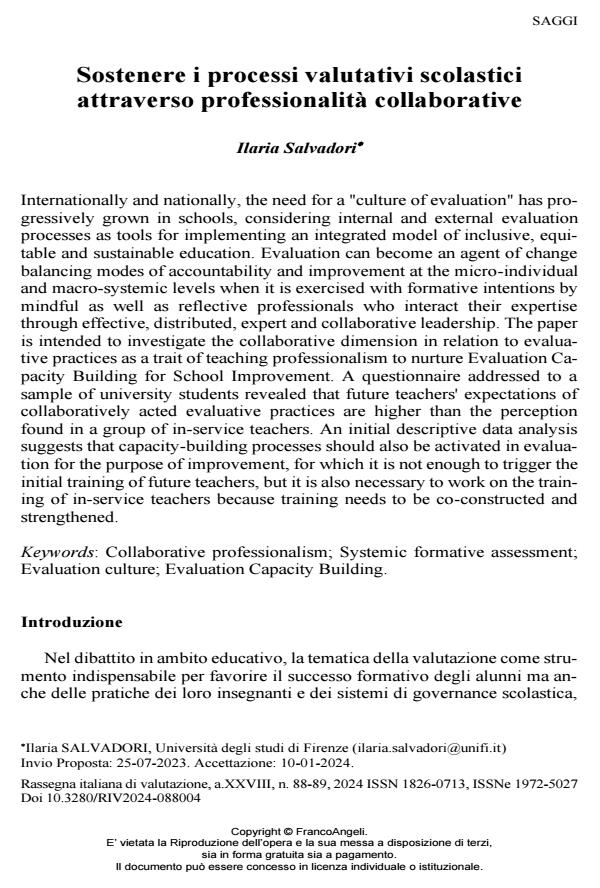Sostenere i processi valutativi scolastici attraverso professionalità collaborative
Titolo Rivista RIV Rassegna Italiana di Valutazione
Autori/Curatori Ilaria Salvadori
Anno di pubblicazione 2024 Fascicolo 2024/88-89
Lingua Italiano Numero pagine 20 P. 55-74 Dimensione file 451 KB
DOI 10.3280/RIV2024-088004
Il DOI è il codice a barre della proprietà intellettuale: per saperne di più
clicca qui
Qui sotto puoi vedere in anteprima la prima pagina di questo articolo.
Se questo articolo ti interessa, lo puoi acquistare (e scaricare in formato pdf) seguendo le facili indicazioni per acquistare il download credit. Acquista Download Credits per scaricare questo Articolo in formato PDF

FrancoAngeli è membro della Publishers International Linking Association, Inc (PILA), associazione indipendente e non profit per facilitare (attraverso i servizi tecnologici implementati da CrossRef.org) l’accesso degli studiosi ai contenuti digitali nelle pubblicazioni professionali e scientifiche.
Internationally and nationally, the need for a "culture of evaluation" has progressively grown in schools, considering internal and external evaluation processes as tools for implementing an integrated model of inclusive, equitable and sustainable education. Evaluation can become an agent of change balancing modes of accountability and improve-ment at the micro-individual and macro-systemic levels when it is ex-ercised with formative intentions by mindful as well as reflective pro-fessionals who interact their expertise through effective, distributed, expert and collaborative leadership. The paper is intended to investi-gate the collaborative dimension in relation to evaluative practices as a trait of teaching professionalism to nurture Evaluation Capacity Build-ing for School Improvement. A questionnaire addressed to a sample of university students revealed that future teachers' expectations of col-laboratively acted evaluative practices are higher than the perception found in a group of in-service teachers. An initial descriptive data analysis suggests that capacity-building processes should also be acti-vated in evaluation for the purpose of improvement, for which it is not enough to trigger the initial training of future teachers, but it is also necessary to work on the training of in-service teachers because train-ing needs to be co-constructed and strengthened.
Parole chiave:Collaborative professionalism; Systemic formative assess-ment; Evaluation culture; Evaluation Capacity Building.
Ilaria Salvadori, Sostenere i processi valutativi scolastici attraverso professionalità collaborative in "RIV Rassegna Italiana di Valutazione" 88-89/2024, pp 55-74, DOI: 10.3280/RIV2024-088004